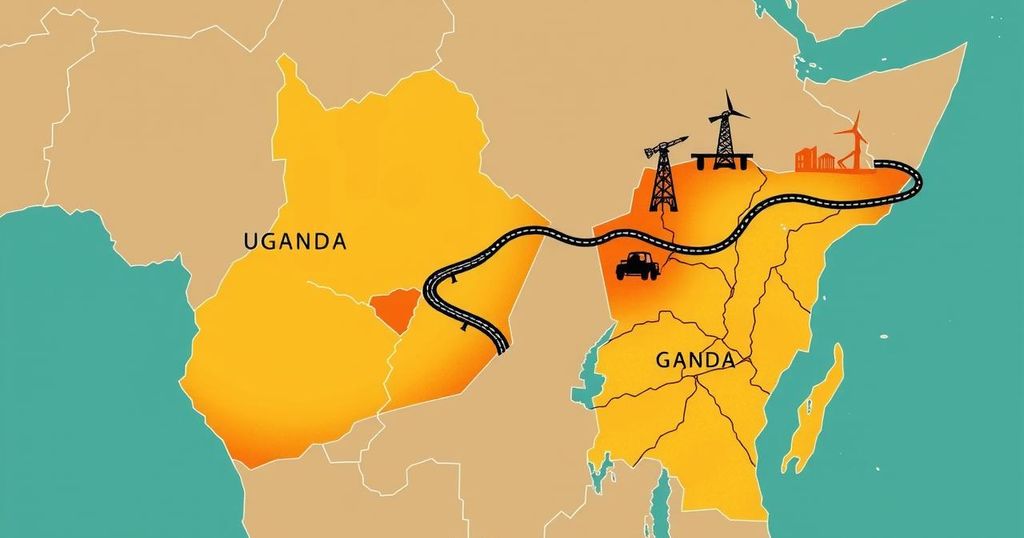South Sudan’s relationship with Uganda is critical, shaped by their intertwined histories and current geopolitical interests. Uganda’s past support during South Sudan’s independence and military involvement during the civil war create complexities for stability and governance. As South Sudan engages economically with Uganda, it must also seek diverse partnerships and address internal challenges to protect its sovereignty and ensure sustainable development.
South Sudan, the world’s youngest nation, is at a pivotal juncture in its relations with Uganda, shaped by historical and cultural bonds alongside contrasting political interests. These complexities have implications for both internal stability and regional economic development. Uganda played a significant role during South Sudan’s independence struggle, aiding the Sudan People’s Liberation Army (SPLA) against the Sudanese government, while ostensibly fighting the Lord’s Resistance Army (LRA) that threatened Uganda.
Post-independence, the relationship has been characterized by cooperation as South Sudan became a market for Ugandan goods and labor, and Uganda facilitated peace processes via IGAD. Additionally, Uganda’s established trade routes benefit South Sudan, which is landlocked. However, the landscape has changed, especially since Uganda’s military intervention during South Sudan’s civil war in December 2013, supporting President Salva Kiir against Riek Machar’s opposition. This military involvement has led to increased tensions and humanitarian crises in South Sudan, resulting in widespread displacement and infrastructure damage.
Despite signing a peace agreement in 2018, South Sudan remains fragmented, with governance troubles exacerbating its humanitarian crisis. Relations with Uganda are complicated by regional geopolitics and mutual military interests in neighboring countries. Uganda’s backing of Kiir has fostered accusations of bias from opposition groups, further complicating the political landscape and involving both nations in a broader regional power struggle.
Economically, competition over resources intensifies as both countries seek to leverage their border’s strategic importance for trade and energy. Uganda’s expansion into South Sudan’s oil sector has drawn scrutiny, emphasizing the need for both nations to manage their relationship to avert conflicts that could hinder economic goals. South Sudan, strategically located in the Horn of Africa, is also influenced by external powers eager for access to its natural resources, complicating its diplomatic stance.
Uganda’s stability and its vested interest in ensuring South Sudan remains stable is intertwined with the historical backdrop of conflict with Sudan, which complicates Uganda’s close ties with Kiir’s government. The involvement of international organizations has further shaped Uganda’s role in South Sudan, pushing for a more unbiased approach that promotes dialogue across factions.
South Sudan must adopt a diplomatic strategy that maintains its defense and economic reliance on Uganda while simultaneously safeguarding its sovereignty. Diversification of international partnerships and strengthening ties with regional neighbors such as Ethiopia and Kenya can create a more equitable foreign policy landscape. Addressing governance issues effectively is critical to reducing dependency on foreign influence and ensuring internal stability.
The path forward lies in fostering inclusive governance and establishing peace to liberate South Sudan from the influence of regional dynamics.
In summary, South Sudan’s relationship with Uganda is multifaceted, marked by a history of cooperation and competition. With ongoing governance challenges and regional geopolitical influences, South Sudan must navigate these dynamics carefully. Establishing diverse partnerships and enhancing internal governance are vital for maintaining sovereignty and stability while harnessing economic opportunities. Ultimately, sustainable peace and effective governance will empower South Sudan to mitigate foreign influences and pursue its development goals.
Original Source: www.radiotamazuj.org






